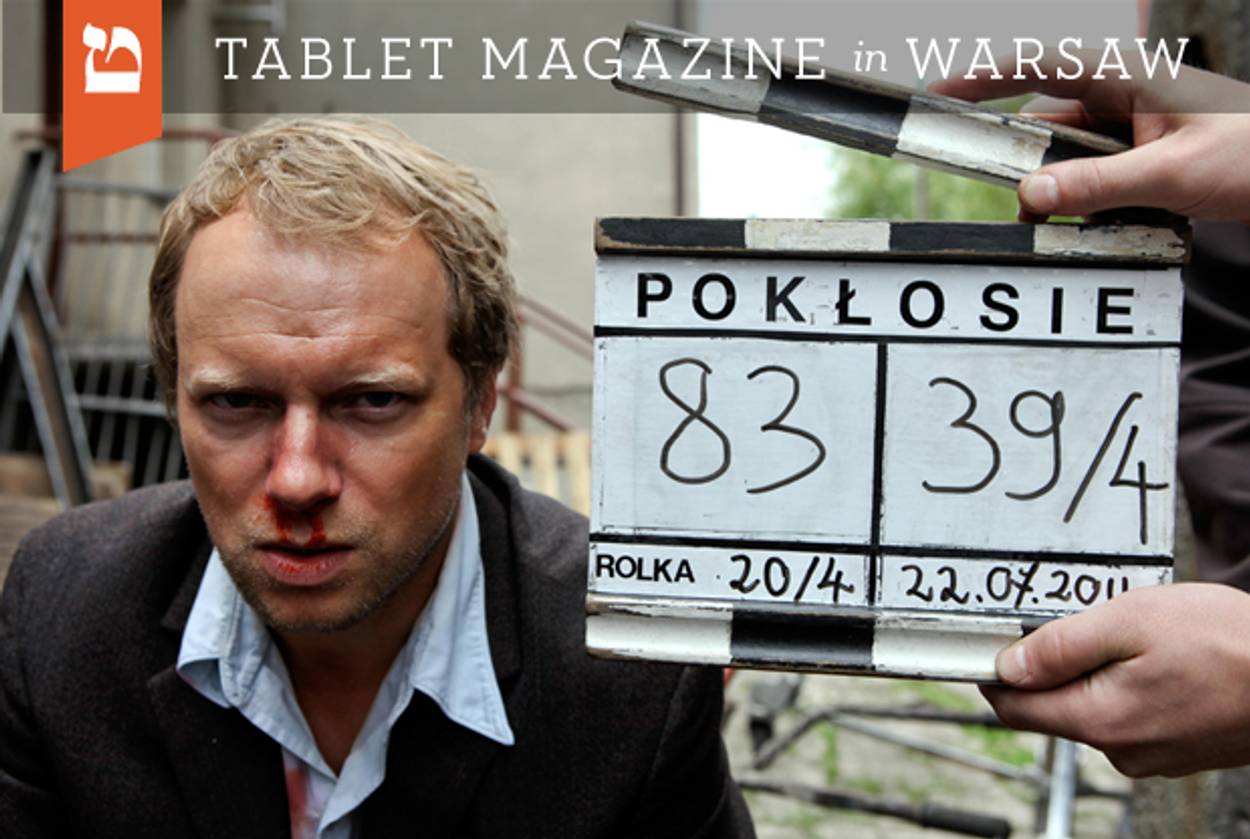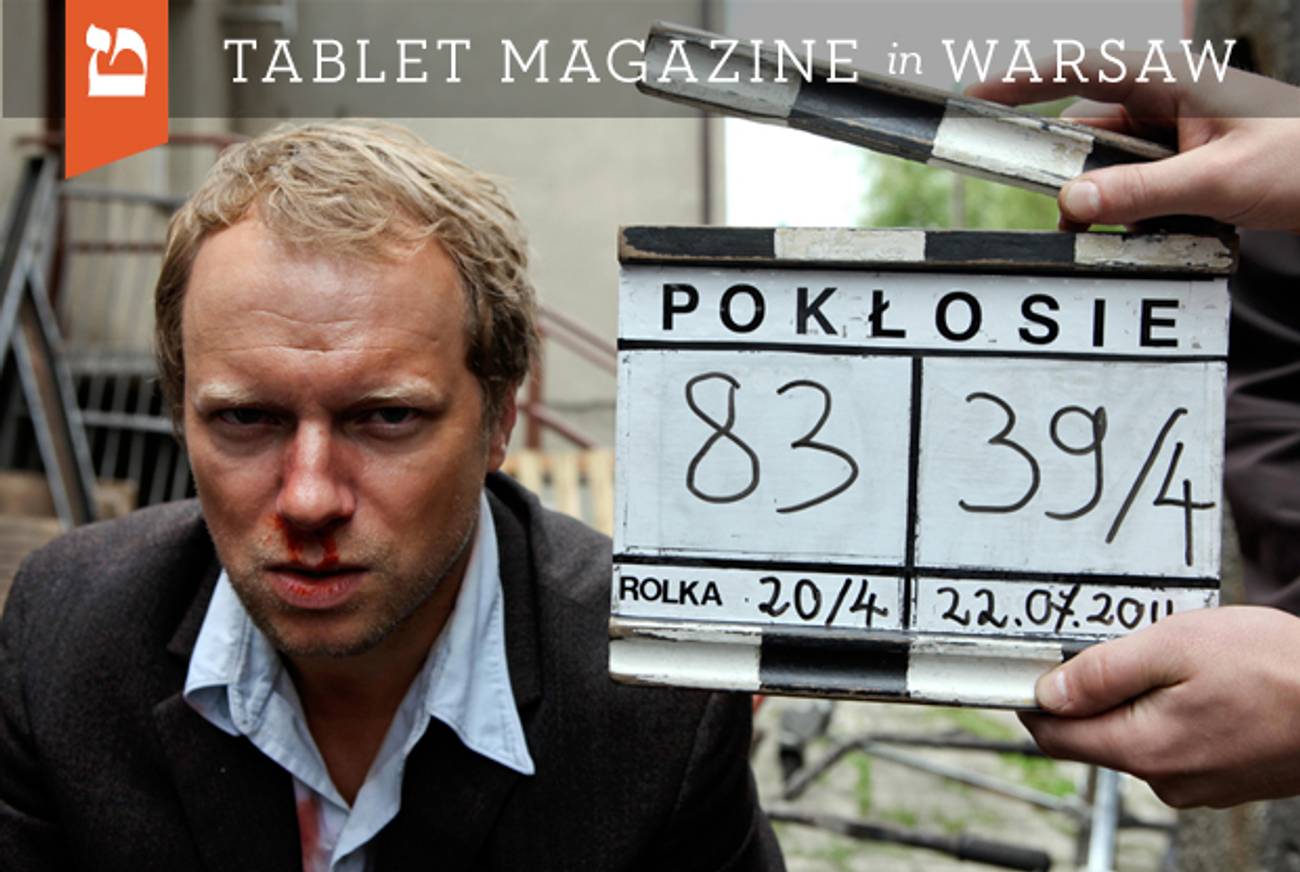In the Polish Aftermath
In a public debate over a controversial new Holocaust film, Poland faces up to a complicated past




On a snowy Sunday in March, dozens of parka-clad Poles trickled in between the pews of Warsaw’s Nozyk Synagogue. They removed their coats and greeted each other with kisses. Upstairs, the women’s section remained empty, as downstairs people quickly outnumbered the modest group of men who usually occupy these seats on Friday nights. Only some of the visitors were Jewish, and none were there to pray. They had come to watch a panel about a film that had come out six months before.
Pokłosie, or “Aftermath,” has beendrawing intense criticism from Polish nationalists, who accuse the film of being “anti-Polish” propaganda and a gross manipulation of historical truth. Over the past few months, Pokłosie has so riled the Polish right wing that it has been banned from some local cinemas, while its leading actor, Maciej Stuhr, has received death threats. There is no righteous Gentile savior at the center of its plot, no shadowy scenes of reenacted horror, no survival against all odds or triumph of the human spirit. In fact, there are no scenes of the war at all, and not a single Jewish character. The film is strikingly devoid of the tropes of Holocaust cinema. Indeed, while the film is squarely about Polish-Jewish relations and the destruction of Poland’s Jewry during World War II, there are no carefully reconstructed flashbacks to when Jews were still around. But that is precisely the source of its unexpected power.
***
Pokłosie, originally titled Kaddish, was written and directed by Władysław Pasikowski, who is best known for making action movies and TV thrillers and who co-wrote the script for Andrej Wajda’s internationally acclaimed 2007 film Katyn. Pasikowski is little known outside of Poland, where Pokłosie premiered at the Warsaw Film Festival in October. The film takes place in the 2000s and tells the story of Franciszek Kalina, a Polish man living in the United States who begrudgingly returns to his backward hometown in the contemporary rural Polish countryside where his brother, Jozef, maintains their family farm. Though nothing has changed in this quaint village of farmers and babushkas, Jozef has. His wife has left him, and Jozef has been drawing the ire of his neighbors through his new-found fascination with the village’s former Jewish inhabitants, whose disappearances remain an unspeakable subject. Jozef spends his nights wresting old Jewish tombstones—long ago stripped from the old Jewish cemetery and used as paving stones (a common practice in Poland both during and after the war)—from the sidewalks and squares around town and then firmly planting them into a new Jewish cemetery he’s created in one of his wheat fields. He painstakingly restores each tombstone, the Hebrew inscriptions of which he’s taught himself to read.
At first, Franciszek is puzzled by his brother’s fascination, but then it takes hold of him, too. Together, Franciszek and Jozef exhume everything from land records to bodies, and they soon discover that the stories the villagers have been telling—about Nazi genocide and Jews intent on returning to reclaim their lands—are lies.
Long before Pokłosie was released, the Polish press documented the various obstacles Pasikowski had in the decade-long process of making his film, from securing financing for his controversial script to struggling with how to best approach what is, for many Poles, still a largely taboo subject. Though Pasikowski is notorious for ignoring interview requests, it was widely reported that he was inspired to write the film after reading Jan Gross’ Neighbors, a historical account of how the entire Jewish community of Jedwabne was murdered on July 10, 1941 not by the Nazis, as was once asserted by official Polish history, but by their Polish neighbors.
When Gross’ book was first published in 2001, it created enormous controversy in Poland, where Communist revisionism not only rewrote the Holocaust’s role in Poland’s national narrative, but also reinforced the Poles’ perception of themselves as absolute victims. Many Poles point to the fact that, unlike most European nations, Poland never officially collaborated with the Nazis, never ran their camps or established Polish SS groups. As a result of this resistance, more than 20 percent of the country’s population was destroyed. For that reason, Auschwitz has long been considered a site not of Jewish suffering, but of Polish suffering—even though half of the country’s death toll included 90 percent of its Jewish population.
After almost six decades of repressed memory, it was Gross’ book that finally got Poland talking. While right-wing, ultra-Catholic nationalists accused Gross of anti-Polish slander, Neighbors inspired among many Poles, including Pasikowski, a new curiosity in Polish Jewish history and its more disagreeable truth. “The changes are dramatic from when Neighbors came out,” Gross told me from his office at Princeton University, where he is a professor of history. “The big difference over the last 10 years is that all the fantastic research on the Holocaust is now being done in Poland.”
Neighbors not only ruptured the Polish silence regarding things Jewish, but it also challenged the widely accepted taxonomy first proposed by the historian of Shoah fame, Raul Hilberg, who claimed that everyone during World War II fit neatly into one of three categories: victims, bystanders, and perpetrators. If the Poles were victims, how could they also be bystanders, at best, or perpetrators, at worst?
“I think a lot of [Polish] self-complacency is a result of this triparte division coming from Hilberg, which is so contentious,” Joanna Tokarska-Bakir, a cultural anthropologist who specializes in Polish-Jewish relations, told me. “These categories are inappropriate for what was really going on in Poland. It wasn’t so black and white, but quite gray. This moment with Neighbors made people realize that we needed a new language to talk about the war.”
Though the movie was inspired by Neighbors, it is not an adaptation of the book, nor a reconstruction of historical events, a fact that is often lost on the film’s dissenters, who include Tomasz Terlikowski, the editor of Fronda.pl, a right-wing nationalist website. Terlikowski, who also participated in the Nozyk Synagogue debate, maintained that the film’s greatest problem was that it was “historically inaccurate,” a statement that elicited disagreeable sighs from the audience.
But the movie is genre-bending in other ways. Pokłosie is, for example, also devoid of the genre’s favorite stock character: the righteous Gentile savior. Jozef Kalina comes closest to this role as we watch him stubbornly memorializing the dead in one of his fields. But Jozef is on a fool’s errand, despite his good intentions. The dead cannot be saved, and Jozef, living on their land, is guilty by association, plagued by an irresolvable mourning that leads to his destruction. And Jozef isn’t responsible for discovering the truth about the Jews’ murderers, either. That quest is reserved for his brother Franciszek, who is a reluctant detective. When Franciszek first arrives in the village, he doesn’t seem bothered by the anti-Semitic graffiti that greets him. Instead, he’s annoyed that he had to return to the Old Country. In America, where he now lives, there are no bad memories, though there are plenty of “Jews running the country,” Franciszek tells Jozef, as they fix a combine together.
Played by the acclaimed Polish film and stage actor Ireneusz Czop, Franciszek captures the off-the-cuff, lightly anti-Semitic talk that pops up in Polish public discourse. Yet, at the same time, Franciszek hunts down court records, digs up bones, wanders the ruins of the old Gestapo headquarters, and asks hard questions of a dying old lady, the last of the generation who lived through the war.
Anonymous Polish villagers wreak havoc on the Kalina brothers as they conduct their search, but they are never shown in the act. Only the evidence of their work is left behind—a rock through a window, graffiti on a barn door, flames engulfing a field. When we do see the villagers, they appear as innocent bystanders, shifting blame to others: delusional in their self-perception of absolute goodness. In Pokłosie, there is no uniformed boogieman to scapegoat, no righteous character to identify with, no absolute victims for whom we can have empathy. By the end of the film, everyone is implicated in the violence of the past. The safe old categories no longer hold.
***
Through last winter, Pasikowski’s film provoked an outpouring of public criticism, launching a second round of the Neighbor’s debate that began in 2001. Soon after the film’s release, Polish patriots and ethno-nationalists accused the film of being part of a Jewish conspiracy to tarnish Poland’s reputation. Obsessed with the film’s tangential relationship to Neighbors, they began invoking Gross’ name and attacked Pokłosie for misrepresenting Poland’s history. “The reaction was not a shock,” Dariusz Jabłoński, one of the film’s producers, said at the Nozyk Synagogue panel. “We knew we were dealing with a subject that was still very much a taboo.”
Still, it was surprising, even to Gross, that the one who received the most ire was Maciej Stuhr, the actor who played Jozef. Soon after he began receiving death threats, Wprost, a national magazine, featured him on its cover, provocatively scrawled in anti-Semitic graffiti meant to echo both the film and the very real harassment to which Stuhr was being subjected. Inside, Magdalena Rigamonti’s article, “Stuhr, You Jew,” chronicled the anti-Semitic backlash against Stuhr—who doesn’t identify as Jewish, though the right-wing press continues to insist he is of Jewish origin. Rigamonti didn’t necessarily approve of the vitriol being hurled at Stuhr, but wrote that she believed Stuhr had brought it upon himself. “He has become a symbol of simplicity and manipulating history for commercial gain,” she wrote.
Others have rallied behind the film. Gazeta Wyborcza, one of Poland’s most widely read newspapers, embraced the work as “outstanding,” while Dwutygodnik, an online arts and culture weekly, ran several simultaneous reviews that all agreed Pokłosie was an important film for all the reasons that made it so hard to watch. For Tokarska-Bakir, the public debate has been emblematic of how far, or not, Poland has come since Neighbors. “The situation is much better and much worse,” she said. “There are so many more people who are inhabiting this space of anti-anti-Semitics. And, at the same time, there is much more acceptance of anti-Semitism in the mainstream culture. Positions have been reinforced.”
Still, much like the film, the one voice that seems strikingly absent from the discussion is that of the Jewish community. Poles are forced to work through the tragic past alone. Even if Jewish audiences from abroad were engaged in the debate, Pasikowski suggests that they could never offer the Poles any real comfort or redemption. In the final scene of the film, a Jewish youth group, like those that frequently come to Poland to tour Holocaust sites, prays at Jozef Kalina’s virtual cemetery. As they shuckle, they stand entirely apart from the film’s action, unaware and untouched by what has just transpired in this little town. They look like alien invaders. Their return does not offer comfort or redemption but only dramatizes the distance between the Jews of the past, the Jews of the present, and the Poles, who exist outside the frame, no better off than before the truth was revealed.
***
Denise Grollmus is a writer and Fulbright scholar currently living in Warsaw.
Denise Grollmus is a writer and Fulbright scholar currently living in Warsaw.